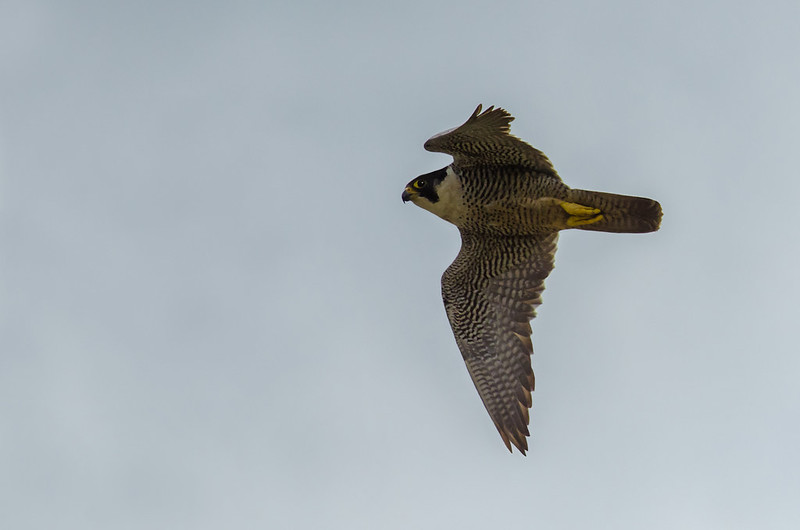Men given community order for possession and trade of 22 wild Peregrines

- On 11 December 2023 Timothy Hall and his son, Lewis Hall pleaded guilty to multiple offences relating to the possession and trade of wild Peregrines in Scotland and were both handed community service orders yesterday for these crimes.
- Without the introduction of sentencing guidelines for wildlife crimes offenders will continue to receive penalties which do not reflect the severity of their crimes.
- Peregrine eggs and chicks are frequently being stolen from nests across the UK to be illegally laundered into the falconry trade and sold for significant sums of money to buyers in the Middle East.
- The RSPB continues to ask for the reinstatement of registration controls for captive Peregrines and an enforcement programme to effectively tackle the theft and illegal trade of these birds.
Yesterday at Jedburgh Sheriff Court, having pleaded guilty to multiple offences relating to the illegal laundering of 22 wild Peregrines, Timothy Hall of Lamberton Holdings, Berwickshire and his son Lewis Hall were handed a 220 hour and 150 hour community service order.
As the RSPB and other environmental Non-Government Agencies have highlighted, due to a lack of sentencing guidelines for wildlife crimes, the outcome of cases such as this are inconsistent and often fail to reflect the severity and significance of the crime. A similar case involving the laundering of wild Peregrines was heard last month at Derbyshire Magistrates Court when a man was sentenced to eight-weeks in prison for the taking of one clutch of eggs. This outcome, when compared to today’s result in Scotland demonstrates a clear misalignment of judicial reasoning.
In 2008, in a cost-cutting exercise, the UK government removed the need for full registration of captive bred Peregrine Falcons, this has created a ‘thief’s charter’ and driven a significant increase in the theft of wild Peregrines, which sees them being virtually untraceable once in captivity.
They are being easily laundered into the legal system of commercial falconry trading and sold to buyers in the Middle East where they are considered to be of a superior quality for falconry racing.
Several Peregrines and eggs were located at the property in southern Scotland which Timothy and Lewis Hall claimed were all captive bred birds. DNA evidence confirmed that many of these birds were in fact not related to the captive adult Peregrines which Hall and his son claimed were the parental birds. Furthermore, the DNA of two of the chicks matched that of two wild adult Peregrines. All wild chicks were believed to have been taken from nests in the Scottish borders, but it is unknown who exactly stole them.
The RSPB wants an urgent return to full registration and the introduction of a targeted compliance and enforcement program, involving DNA testing. These changes to existing legislation will expose the extent of criminality and provide an effective deterrent to the taking of wild Peregrines for the illegal wildlife trade.
Ian Thomson, RSPB UK Investigations Manager: “Although it’s hard not to be disappointed with the outcome, the RSPB commends the exemplary partnership work by the Scottish Society for Prevention of Cruelty to Animals (SSPCA), Police Scotland, National Wildlife Crime Unit (NWCU), Scottish Raptor Study Group, Animal and Plant Health Agency (APHA), Science and Advice for Scottish Agriculture (SASA) and the Crown Office and Procurator Fiscal Service which secured this conviction.”
Mark Thomas, RSPB UK Head of Investigations: “This recent case highlights that raptor persecution offences which are happening routinely across the UK, are not receiving the proper and necessary punishments even when the evidence is infallible, due to a lack of sentencing guidelines for Judges, Magistrates and Sheriffs. Without specific guidelines, the sentencing of crimes relating to the persecution of birds of prey and other wildlife handed down by law courts will continue to misrepresent the impact of these offences and will not act as an effective deterrent to those willing to commit these crimes in the first place.”
ENDS
[registration_form]
How many hours did they get? Because community service is probably a good way to go. Means nobody can pay the fine for them, they gotta do it themselves, and we’re trying to cut down the number of people in jails because they don’t work in terms of deterring crime or preventing recidivism, community service tends to work well because, well, it is work. Just depends how few or many hours they got. Those sentences seem too few. A couple of thousand hours would be more appropriate.
In principle I agree, provided the community service sentence is sufficiently onerous to be commensurate with the crime and provided that the same approach to sentencing is applied to other categories of crime as well. Wildlife crime is obviously perceived by many people, including in the criminal justice system, as being less serious than other types of crime and this needs to change.
That perpetrators of raptor persecution offences get community service sentences whilst non-violent environmental protestors get custodial sentences is ludicrous and offensive.
Given that penalties for wildlife crimes have been increased in Scotland I was extremely disappointed with the sentences. It took many hours of careful work to obtain the evidence and present it and one hoped a custodial sentence would have followed. I’d have banged them both up for 5 years. As it is it invites this sort of crime given the difficulty of detection and the potential profit.